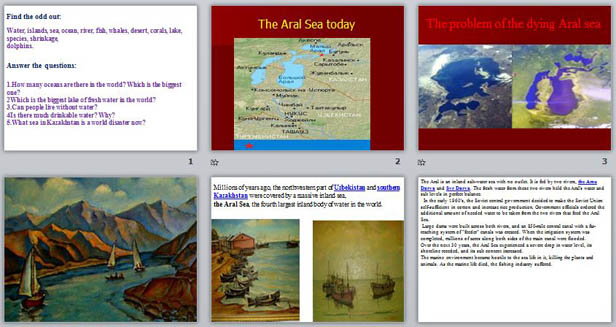
Find the odd out:
Water, islands, sea, ocean, river, fish, whales, desert, corals, lake, species, shrinkage,
dolphins.
Answer the questions:
1.How many oceans are there in the world? Which is the biggest one?
2Which is the biggest lake of fresh water in the world?
3.Can people live without water?
4Is there much drinkable water? Why?
5.What sea in Kazakhstan is a world disaster now?

The Aral Sea today

The problem of the dying Aral sea


Millions of years ago, the northwestern part of Uzbekistan and southern Kazakhstan were covered by a massive inland sea ,
the Aral Sea , the fourth largest inland body of water in the world.

The Aral is an inland salt-water sea with no outlet. It is fed by two rivers, the Amu Darya and Syr Darya . The fresh water from these two rivers held the Aral's water and salt levels in perfect balance .
In the early 1960's, the Soviet central government decided to make the Soviet Union self-sufficient in cotton and increase rice production. Government officials ordered the additional amount of needed water to be taken from the two rivers that feed the Aral Sea .
Large dams were built across both rivers, and an 850-mile central canal with a far-reaching system of "feeder" canals was created. When the irrigation system was completed, millions of acres along both sides of the main canal were flooded .
Over the next 30 years, the Aral Sea experienced a severe drop in water level, its shoreline receded, and its salt content increased. The marine environment became hostile to the sea life in it, killing the plants and animals. As the marine life died, the fishing industry suffered.

The Aral Sea was a rich source of fish. Some 20 species were identified by biologists, including sturgeon and catfish. The town of Muynak, located on the edge of the sea, was a fishing town that also attracted travelers to its seaside vistas .

Today, Muynak is a desert town more than a hundred kilometers from the sea. The only reminders of the once thriving fishing activity are the rusting hulks of ships and an ancient fish plant. The sea has shrunk to two-fifths of its original size and now ranks about 10 th in the world. The water level has dropped by 16 metres and the volume has been reduced by 75 percent, a loss equivalent to the water in both Lakes Erie and Huron. The ecological effect has been disastrous and the economic, social and medical problems for people in the region catastrophic. All 20 known fish species in the Aral Sea are now extinct, unable to survive the toxic, salty sludge

Here are some of the results of the shrinking of the Aral Sea:
- As water has been drained from the rivers for cotton farming, the sea's water has become much saltier.
- As more water has been taken from the rivers, the sea's water level has decreased by over 60%.
- Drinking water supplies have dwindled, and the water is contaminated with pesticides and other agricultural chemicals as well as bacteria and viruses.
- The farms in the area use some highly toxic pesticides and other harmful chemicals. For decades, these chemicals have been deposited into the Aral Sea. When the wind blows across the dried-up sea, it carries dust containing these toxic chemicals.
- Lakes and seas tend to have a moderating effect on the climate. In other words, the land right next to a body of water tends to be warmer in the winter and cooler in the summer than land that's not near the water. As the Aral Sea has lost water, the climate has become more extreme.

The air has salt, dust and pollutant blown from the sea. Many people and animals suffer from different illnesses.

Thousands of ships are on the dried-up area of the Aral Sea…






The Aral Sea Disaster - Moynaq’s Fishermen without a Sea.


The Aral Sea is one of the environmental disasters of the world.

The future of the Aral Sea and people living in his area depends on us.
It is necessary to rescue the Aral Sea.

Britain's Ecological Activity
The British Government will aim: ♦ to preserve and enhance Britain's natural and cultural inheritance; ♦ to encourage the more prudent and efficient use of energy and other resources; ♦ to make sure that Britain's air and water are clean and safe, and that controls over wastes and pollution are maintained and strengthened where necessary.
The world's population doubled between 1950 and 1987. More people means more mouths to feed, and that demands more agricultural land. That in turn can lead to deforestation and soil erosion.
By burning forests, draining wet lands, polluting water courses and overfishing mankind is rapidly driving many species to extinction.
The Government is supporting international efforts for a global agreement to protect species of plant and animal life. The Government is also supporting projects to conserve endangered species of wild life such as the black rhino and the African elephants.
Action Taken:
Britain attaches particular importance to the environmental policy of the European Community.
Much has already been achieved: since Britain joined, the Community has adopted some 280 environmental measures, including far-reaching-legislation to combat acid rain, curb pollution from cars and industry, conserve wildlife and ensure public access to information about the environment.
enhance -увеличивать, prudent use of energy- экономное использование энергии, avert- избегать , с ombat -бороться, curb -сдерживать, access -доступ, extinction- исчезновение, drain -осушивать


 Получите свидетельство
Получите свидетельство Вход
Вход

































 Проблема Аральского моря (английский, язык) (0.78 MB)
Проблема Аральского моря (английский, язык) (0.78 MB)
 2
2 3977
3977 854
854 Нравится
0
Нравится
0




